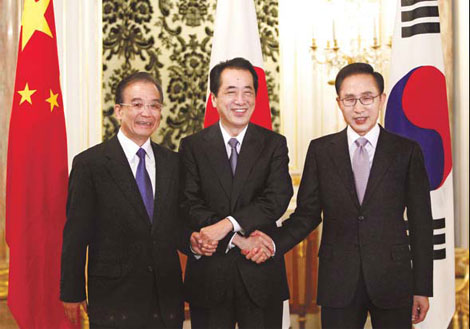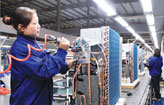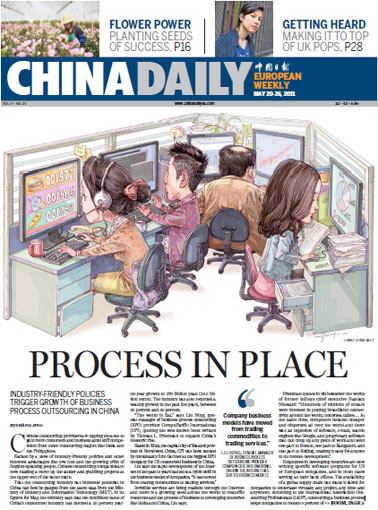Foreign and Military Affairs
FTA good for more robust growth
Updated: 2011-05-22 07:57
By Lan Lan (China Daily)
|
 China's Premier Wen Jiabao, Japanese prime minister Naoto Kan and South Korea's President Lee Myung-bak meet for a trilateral summit in Tokyo late on Saturday. [Photo Credit / Goes Here] |
China, Japan and South Korea to complete feasibility study in 2012
BEIJING - Economists said the sooner a trilateral free-trade agreement (FTA) can be concluded among China, Japan and South Korea, the better it will be for a robust and sustainable growth in the region.
Apart from breaking existing barriers, the experts also stressed that mutual trust among the neighbors is vital for reaching such a deal.
|
||||
Wang Luo, an economist with the Chinese Academy of International Trade and Economic Cooperation, a think-tank under the Commerce Ministry, said it is hard to say how soon the neighbors will launch FTA talks after the study.
"All three countries have their sensitive issues. It depends on whether they can reach consensus on these," Wang said.
The trilateral study has gone on for several years but had moved slowly because each country has weak industries which had put up strong resistance in case the FDA may hurt their interests.
In South Korea, these include agricultural, fishery and forestry sectors which are concerned that local industries will be affected if the market is opened up, as China would have comparative advantages. Japan, too, has similar concerns about South Korea and China.
By the same reckoning, Chinese companies are weaker in high-tech industries such as semiconductors, smart phones, and service sectors as well as some medium high-tech industries such as shipbuilding and the steel industry, compared with Japan and South Korea.
Though barriers and concerns exist, formal FTA talks must start as soon as possible. The intertwined economies of the neighbors should accelerate the process, according to Zhang Jianping, senior researcher at the Institute for International Economic Research under the National Development and Reform Commission.
"Sustainable economic growth in Asia has become a pillar for world economic growth after the financial crisis, and the trilateral FTA is an important tool to explore further potential and continuous growth," Zhang said.
"China's high-tech industries have developed very quickly, the later the deal is finalized, the harder the talks will be and Japanese and South Korean companies will have less competitive edge," Zhang said.
Moon Joong Tcha, managing director of the Center for International Development under the Korea Development Institute, a leading economic policy think-tank of South Korea, said regional integration is a worldwide trend and will bring various benefits including larger markets, productivity enhancement and welfare improvement for the whole nation.
"In the long run, after an FTA is activated, as restructuring and proper government policies are implemented, all participants will enjoy the benefits," he said. "Rapidly changing global environments may accelerate this process, but basically the process will not be completed in a short time."
Even after the FTA talks are completed, it will still be a long process for the agreements to get ratified by the parliament in South Korea, he warned.
Zhan Xiaohong, a researcher with the Chinese Academy of Social Sciences, pointed out that mutual trust is still not sufficient among the three countries due to historical factors, and that is an intangible hurdle that may delay negotiations.
China, Japan and South Korea account for about 70 percent of the Asian economy, and about 20 percent of the global economy.
If established, the FTA will realize the third-largest economic cooperation in the world with a consumer population of 1.5 billion, coming after only the North American Free Trade Agreement and the European Union.
E-paper

Thawing out
After a deep freeze in sales during the recession, China’s air conditioner makers are bouncing back
Cool Iron lady
Of good and evil
Build on security initiatives
Specials

Memory lanes
Shanghai’s historic ALLEYS not just unique architecture but a way of life

Great expectations
Hong Kong-born singer songwriter rises to the top of the UK pops.

A diplomat of character
Belgian envoy draws on personal fascination to help build China ties.


